- Home
- Joan Lowery Nixon
Haunted Island Page 2
Haunted Island Read online
Page 2
It didn’t take long to find out that there was a lot more work to be done than I’d thought. The outside of the house and the land around it were well kept, but the inside of the house needed to be swept and scrubbed and painted. I worked hard, and soon the rooms were a lot cleaner. Joshua didn’t have much laid by in the way of food, but the second day I was in that house I went down in the cellar to see what I could find. Just as I had thought, there was a bin, and in the bin were stored some carrots and potatoes. I took some upstairs with me and fixed them for dinner. I wasn’t too good at cooking vegetables, so they were kind of mushy from being overcooked, but at least they made more of a meal than just meat and bread.
I was real proud of the platter of boiled beef and the large bowl of potato and carrot chunks I put in front of Joshua Hanover. But when he came to the kitchen table and saw the meal, he suddenly gripped the edge of the table and shouted, “Where did you get those vegetables?”
“In the cellar, Mr. Hanover,” I said, wondering what was the matter. They didn’t look that bad.
Joshua was so angry that it frightened me. “You’re never to go down in the cellar! Never again! Do you understand me?” he yelled.
“But since that’s where you keep the vegetables—”
Joshua interrupted me. “You tell me when you need carrots and potatoes, and I’ll bring them up to you. Have you got that straight?”
“Yes, sir,” I whispered.
We ate the meal in silence, while I wondered what Joshua kept in the cellar. Obviously, it was something he didn’t want me to see. I was curious, but not curious enough to want to find out—not when every time I thought about sneaking down into the cellar to take a look around I could remember the furious gleam in Joshua Hanover’s eyes.
I was well worth my keep. I kept to the chores, only once in a great while taking a few minutes to walk along the riverbank and peer into the small limestone caves that dotted the hill. There were times when I wished for a friend to explore with, but I had been born to a life of work, not play, and I accepted it.
Joshua never complimented me for the work I did, except for one day when he looked around the room as though it was the first time he’d seen it and said, “I like having the house tidied up.”
“Thank you, sir,” I said.
But Joshua scowled again and added, “Things could be better, though. Can’t say much that’s good about your cooking.”
I had been at the Hanover farm for about three months when one Tuesday morning Joshua set up the tub, heated buckets of water on the wood stove, and sent me out to do chores in the barn.
I stared at the tub. “You’re going to take a bath?” I asked. “But it’s Tuesday, Mr. Hanover, not Saturday.”
“Never you mind,” Joshua said. “I’ve got a reason.”
After a while he called me to come back to the house. By this time Joshua was shaved and dressed in clean clothes. “We’re going to town,” he told me. “You and Shadow can ride in the back of the wagon.”
I didn’t like being that close to Shadow, but I didn’t have a choice. I hugged my side of the wagon, hanging on tightly as it bounced in and over the ruts in the road. I was relieved that Shadow sat staring out the other side of the wagon, ignoring me.
We drove past the block of stores in the small town, and some of the people on the street stared to see Joshua Hanover dressed up and riding into town. A few people followed the wagon, and I knew they were as curious as I was about what Joshua was up to.
Joshua tied the horse’s reins to the rack in front of Owens’s dry goods store, then stepped up onto the wooden sidewalk. I was unsure of what was going to happen, so I stayed where I was, even though the heat of the midday sun made sweat run down my back.
“Do you want me to carry anything from the store?” I asked him.
“Don’t need anything,” he said. He pulled out a large, round pocket watch and looked at it. “I’m waiting for the stage to get here.”
In a short while we could hear the sound of horses’ hooves and the rattle of the stagecoach as it approached the town. By this time others had come to wait, too, many of them curious people who liked to watch the stagecoach arrive and depart, since it didn’t come more than a couple of times a month. Today Joshua seemed to be more interesting to the people than the stagecoach, so there was a little group standing at one side, watching him as the coach bounced and clattered around the bend in the road, and the driver pulled his sweaty horses to a stop.
Joshua moved forward and waited. As the dust settled around the coach wheels, the driver jumped from his platform and opened the stagecoach door. Everyone watched eagerly to see who would step down from the coach.
3
“WHO WAS IT?” AMY asked.
“Give Mr. Corley a chance,” Chris said, “and he’ll tell us.”
Mr. Corley nodded and continued his story.
A young woman stepped off the stagecoach, carrying a small satchel and taking the driver’s hand to keep her balance. She wasn’t pretty. Her clothes were plain and looked too big for her, and her brown hair was pulled tightly into a knot at the back of her neck. Her only jewelry was a thin, twisted gold chain that she wore around her neck. Her eyes were wide and a little bit scared as she peered out from under the brim of a black straw hat.
Joshua took a step forward. His perpetual scowl seemed even deeper. “Are you Amelia Jones?” he asked.
Her chin quivered, as though she was going to cry, but she raised her chin, took a deep breath, and said, “Yes. I’m Amelia Jones. I’m here to marry Joshua Hanover.”
Some of the folks in the crowd murmured and gasped at that, but Joshua paid no mind to them and spoke up.
“I’m Joshua Hanover,” he said. “My wagon’s over there. Just follow me.”
He started to turn, but Amelia held out her satchel to him. He blinked at it for a minute, as though he was wondering what to do with it, then took it from her and carried it to the wagon. Amelia followed.
Shadow growled low in his throat, but Joshua told him to be quiet. “That’s my dog, Shadow,” he said. “He won’t bother you after he gets used to you.” He climbed up on the seat and said to Amelia, “Hurry up. Let’s get going.”
But before she climbed up on the high seat with Joshua, she looked at me, and for the first time she smiled. “Who’s this?” she said. “You didn’t say you had a son.”
“He’s not my son,” Joshua said. “He’s just a boy who works around the place.” He picked up the reins and clucked at the horse.
“But he has a name,” Amelia said. She smiled at me again. “What’s your name, young man?”
“Amos Corley,” I answered, smiling back.
“Let’s go,” Joshua snapped. Amelia climbed on the seat and held on tightly as the wagon jerked into motion.
The horse began plodding down the main street of town. Joshua didn’t say anything, so Amelia twisted to look at me. “Do you live here in town?” she asked.
“No, ma’am,” I said. “I’m just working my way north. I’m an orphan.”
“So am I,” Amelia said, and smiled.
I wondered why I had thought she was plain. Her smile made her whole face light up. I liked her smile, and I liked Amelia.
Joshua pulled up the horse so abruptly that Amelia lost her balance and almost fell from the wagon. “Here’s where we meet the county judge who’ll marry us,” Joshua said. He waited a minute while Amelia smoothed down her skirt and adjusted her hat. “You want to change your mind?”
She took a long look at him. “No,” she said. “Might as well go forward. I’ve got nothing to go back to.”
Joshua tied the horse to the nearest post and turned to me just as I was climbing out of the wagon. “You stay here with Shadow. This won’t take long.”
Amelia looked so scared I thought she needed a friend with her, and I wanted to be her friend. “I’ve never been to a wedding,” I complained. “I’d like to come, too.”
Before Joshua coul
d answer, Amelia spoke up. “Weddings have got to have witnesses,” she said. “Amos can be our witness.”
Joshua didn’t say a word. He walked up the wooden steps and into the office of the county judge. I hopped down from the wagon, and Amelia and I followed him.
He was right. The ceremony took just a couple of minutes. The judge read it from a book. Joshua and Amelia said, “I will,” or something like that, and the judge told them they were married. They both signed their names on a paper, and we left to go directly to the farm.
It was nice having Amelia there. She thought of all sorts of things to do to that house besides cleaning it. She painted the inside walls white and made some blue-and-white flowered curtains and planted some flowers by the front door. Sometimes she rowed out in the little boat and fished and brought back a good supply of catfish for dinner, which she fried up with cornmeal all brown and crunchy on the outside and flaky and delicious on the inside.
Could she cook! She made a mutton stew good enough to brag on, and biscuits that rose high and light, and a squash pie with cinnamon and nutmeg that smelled almost as good as it tasted.
Some ladies from the town came to call on Amelia, but Joshua let it be known that he didn’t welcome visitors, so the ladies stopped coming. If Amelia was lonely or unhappy, she didn’t let on. She was shy, she was plain, but she was practical. She was determined to be a good wife, and she was.
I liked to talk to Amelia, so I stuck around. That seemed to be all right with Joshua. He just set me to jobs out in the barn and the fields. I’d hurry to get to meals before Joshua would, just so I’d have a few minutes to listen to Amelia and what she had to say. She told me that she had no living relatives and had answered Joshua’s ad for a wife, which he’d put in a Boston newspaper. The gold chain, which she wore every day, was her only tie to the parents she had lost when she was young, and it was the only possession she treasured.
Amelia had very few possessions, and I don’t think Joshua gave her anything besides a thin, plain wedding ring. He was a strange person. It was easy to see that he liked Amelia. I think he actually fell in love with her. But love didn’t make him happier. It seemed to make him meaner.
He acted suspicious of anyone who spoke to her when they went to town for supplies, and was jealous of anyone she talked to. As the cold weather came on, Amelia insisted that I be allowed to spend some time after dinner in the house, where it was light and warm, instead of in the small room I’d made for myself in the barn. Joshua finally agreed, but he hardly had a word to say to me, and I honestly thought he’d soon be sending me on my way.
Shadow didn’t like Amelia, even though she gave him some choice scraps and always made sure his water bowl was filled with fresh water. I think he was jealous of her being there. He’d curl up near the fire and close his eyelids, looking as though he had gone to sleep. His breathing would be steady and heavy, whistling through his nose. But he wasn’t really asleep. If anyone had looked closely, they’d have seen tiny, gleaming slits, where he was peeking through. All evening Shadow would keep his eyes on Amelia, watching her every move. I think she was a little scared of him. I know he scared me.
One frosty morning—December 12, I well remember—I went to the house with my arms full of firewood. Amelia let me in and helped me pile the wood in the bin near the big iron stove. She’d put a big bowl of red apples on the table and arranged some short pine boughs around it.
Besides the big apron she wore over her clothes during the day, she had a cloth tied over her head. “I’m going to tackle some heavy cleaning,” she told me. She cocked her head to one side and looked at me. “Want to help?”
“Yes, ma’am,” I said. “What do you want me to do?”
“Help me move some of that rubbish in the cellar.”
I gasped. “But Mr. Hanover won’t let me go into the cellar.”
Amelia shrugged. “Well, he hasn’t done a thing to clean it up, and I don’t like living over such a dump heap. End of an old year, start of a new, the house should be clean from top to bottom.”
“One day I went down just to get some carrots and potatoes from the bin,” I said, “and he got real mad. He told me never to go down there again. Didn’t he tell you that, too?”
“There’s no telling what gets that man upset,” she said, and for a moment she got a sad, faraway look, as though she was thinking about something else. Then she shook her head a little and picked up the broom. “Whatever reason he’s got for not wanting anyone down in the cellar isn’t enough,” she said. “Even though it is just a dirt floor cellar, it’s thick with dust and needs cleaning out. Besides, I’m his wife. I ought to be able to clean the cellar if I want to.”
I didn’t want Joshua Hanover to be angry with me, but I didn’t want Amelia Hanover to have to tackle that job by herself. My friendship for Amelia was stronger than my fear of Joshua. I would do anything for her, so I said, “Just tell me what you want me to do.”
“Bring a lantern,” she said. “We’ll clean out every crack and corner.”
I lit a lantern and followed her down the cellar stairs.
There were boxes and barrels, and piles of old rusted tools, and a few broken bottles and jars, and some moth-eaten rags, and dirt everywhere.
“Move that big box in the corner,” Amelia said.
I did, and a rat ran out, right over my feet.
Amelia didn’t shriek. She just swatted at him with the broom, but he ducked into a hole in the wall and disappeared. “After we clean this place, let’s board up that hole,” she said.
We used an empty box to carry up loads of rubbish and dirt, and after a while the cellar began to look a lot better.
“Over there—under the stairs,” Amelia told me. “Something is crammed under there. Can you pull it out?”
I got down on my knees and tugged. It was a canvas sack of some sort and fairly heavy. I dragged it out where we could see it. The top was folded over and lashed with a buckle.
“What in the world is that?” Amelia asked. “Can you open it?”
I opened the leather thong and the buckle and spread the top of the sack wide. The lantern gleamed on the contents. Inside the sack, almost to the brim, were silver coins.
“Oh, dear!” Amelia gasped and took a step backward.
“So that’s why—” I began, but a terrible sound choked off whatever I was going to say.
Behind us, on the stairs, was a loud, growling noise. We whirled around to face the sound, and I honestly couldn’t say if the growl came from Shadow or Joshua Hanover. Shadow’s lips were pulled back, his sharp teeth bared. Joshua’s eyes gleamed as red as the light from the lantern, and his mouth was open and twisted into an angry grimace.
“Joshua,” Amelia stammered, “I—I wanted to clean this cellar, and I—I—”
Joshua opened his mouth wider, but the only sound that came out was a horrible groan.
4
“WHAT DID YOU DO?” Chris asked.
“I know what I would have liked to do,” Amos said. “I would have liked to kick up my heels and run away from that place as fast as I could.”
“But you didn’t. Or did you?” Amy asked.
“I didn’t,” Amos said, “because I was too frightened to move. Amelia’s the one who should get credit for bravery.”
“Why?” Amy leaned forward eagerly.
“I’ll tell you,” Amos said, and he rocked back and forth for a few moments before he continued his story.
Amelia stood as tall as she could and looked Joshua straight in the eyes. “It is my job to keep this house tidy and comfortable,” she said. “This cellar is part of the house.”
“You have no right to touch my money!” Joshua shouted.
“Your money is still your money, and you may keep it wherever you choose,” Amelia said. “I do not want your money, but I do want a clean house.” She pointed at the hole the rat had run into. “Without rats in it!”
Joshua’s eyes shifted to me, and I felt as thoug
h my knees were melted butter and I’d fall over at any minute. “I warned this boy to stay out of the cellar! He disobeyed me!”
“Amos told me of your orders,” Amelia said, “but I asked him to come down here to help me. Blame me for his being here, not him.” She put a hand on my shoulder and added, “He doesn’t want your money, either.”
Joshua was in control now. He had calmed down, but his features were still twisted into a ferocious scowl. “I am the only one who has known where my money is hidden.”
Amelia fingered the gold chain at her throat. Even in the lantern light I could see two bright spots of red on her cheeks and noticed that her fingers trembled just a little. “As I told you, Joshua, neither Amos nor I want any of your money. You may hide it wherever else you please. We will not look for it, although since I am your wife I would think you would trust me.”
Joshua stared at her for a long moment, then grumbled, “I trust no one.” He grabbed the sack of money, fastened it, and shoved it back under the stairs. Then he turned to face us. “Never come into this cellar again,” he snapped.
He waited while Amelia and I climbed the stairs, Shadow at our heels.
Amelia gave me a little push when we were back in the kitchen. “Go outside and get to work,” she whispered.
I was only too glad to get out of the house. My mouth was dry and my hands were clammy. I hurried into my coat and gloves and ran out to the barn.
I worked hard all day, even skipping the noon meal, afraid of seeing Joshua again. It was a strange day, too. The chickens were nervous, suddenly flapping into the air and squawking as though they’d seen a fox. The old horse—I had never heard Joshua call him anything but “Horse”—was skittish, kicking against the boards in his stall. I let him run free in the meadow, but he laid back his ears, whinnied, and galloped in one direction and then another as though he were demented. Even the birds would now and then rise from their perches in the trees in noisy clouds, swooping away like puffs of black smoke. Maybe the animals sensed the danger and fear at the Hanover farm. I didn’t understand what was causing their strange behavior.

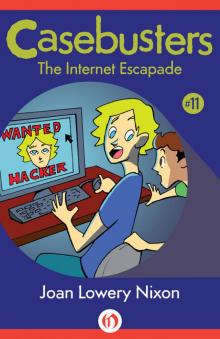 The Internet Escapade
The Internet Escapade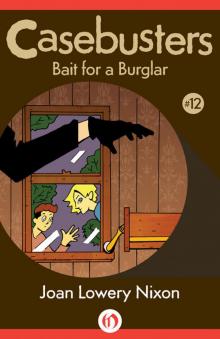 Bait for a Burglar
Bait for a Burglar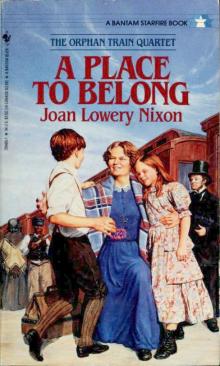 A Place to Belong
A Place to Belong Nightmare
Nightmare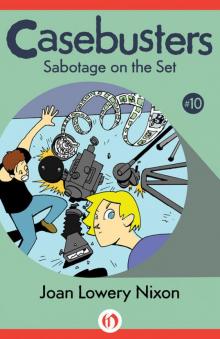 Sabotage on the Set
Sabotage on the Set The Other Side of Dark
The Other Side of Dark Whispers from the Dead
Whispers from the Dead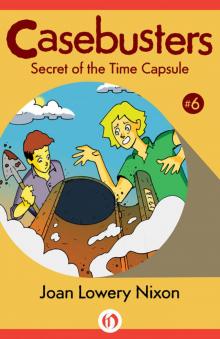 Secret of the Time Capsule
Secret of the Time Capsule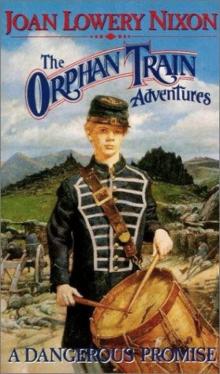 A Dangerous Promise
A Dangerous Promise Laugh Till You Cry
Laugh Till You Cry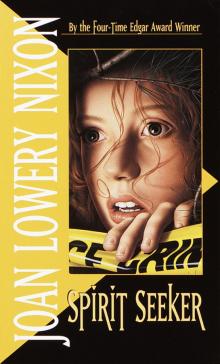 Spirit Seeker
Spirit Seeker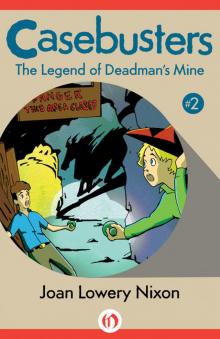 The Legend of Deadman's Mine
The Legend of Deadman's Mine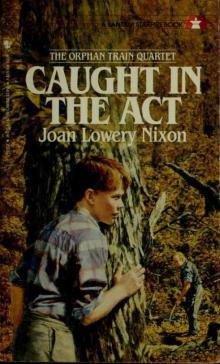 Caught in the Act
Caught in the Act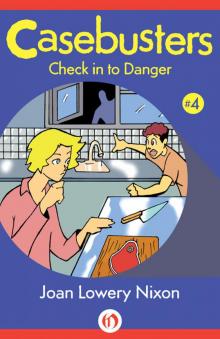 Check in to Danger
Check in to Danger Ellis Island: Three Novels
Ellis Island: Three Novels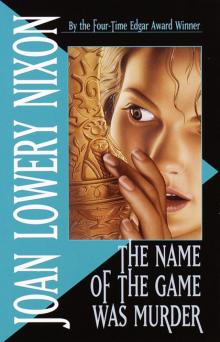 The Name of the Game Was Murder
The Name of the Game Was Murder The Haunting
The Haunting Lucy’s Wish
Lucy’s Wish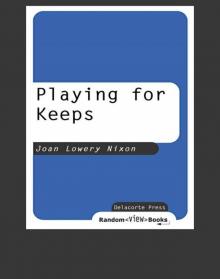 Playing for Keeps
Playing for Keeps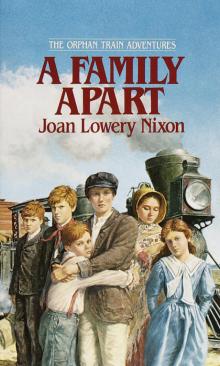 A Family Apart
A Family Apart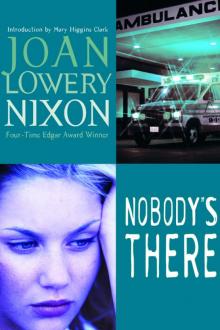 Nobody's There
Nobody's There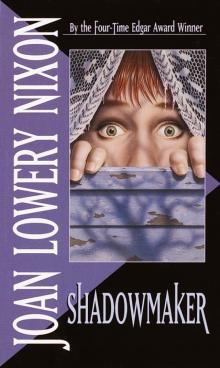 Shadowmaker
Shadowmaker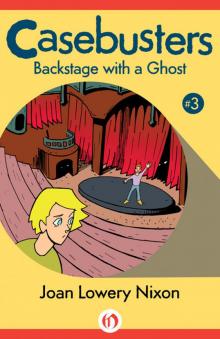 Backstage with a Ghost
Backstage with a Ghost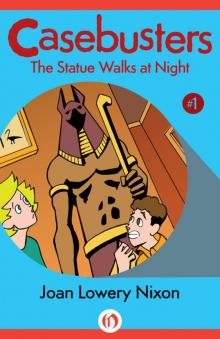 The Statue Walks at Night
The Statue Walks at Night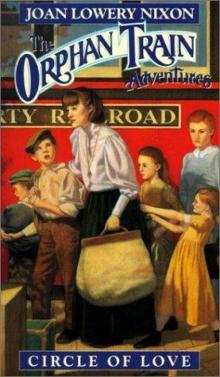 Circle of Love
Circle of Love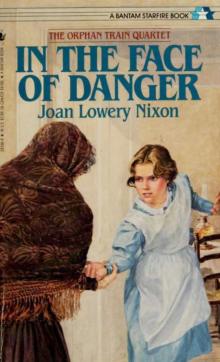 In the Face of Danger
In the Face of Danger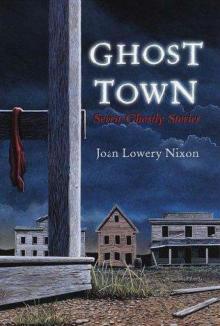 Ghost Town
Ghost Town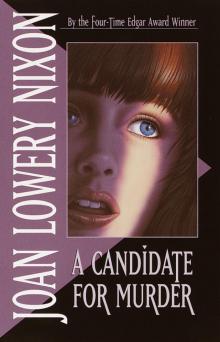 A Candidate for Murder
A Candidate for Murder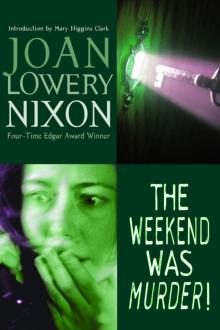 The Weekend Was Murder
The Weekend Was Murder The Island of Dangerous Dreams
The Island of Dangerous Dreams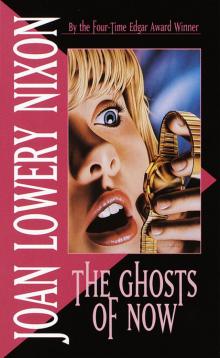 The Ghosts of Now
The Ghosts of Now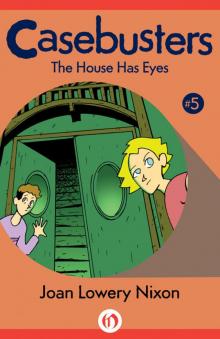 The House Has Eyes
The House Has Eyes The Dark and Deadly Pool
The Dark and Deadly Pool Keeping Secrets
Keeping Secrets Secret, Silent Screams
Secret, Silent Screams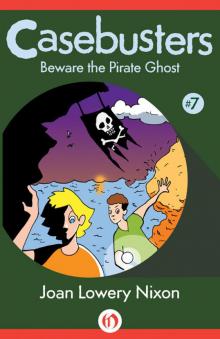 Beware the Pirate Ghost
Beware the Pirate Ghost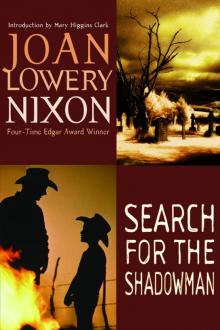 Search for the Shadowman
Search for the Shadowman Haunted Island
Haunted Island